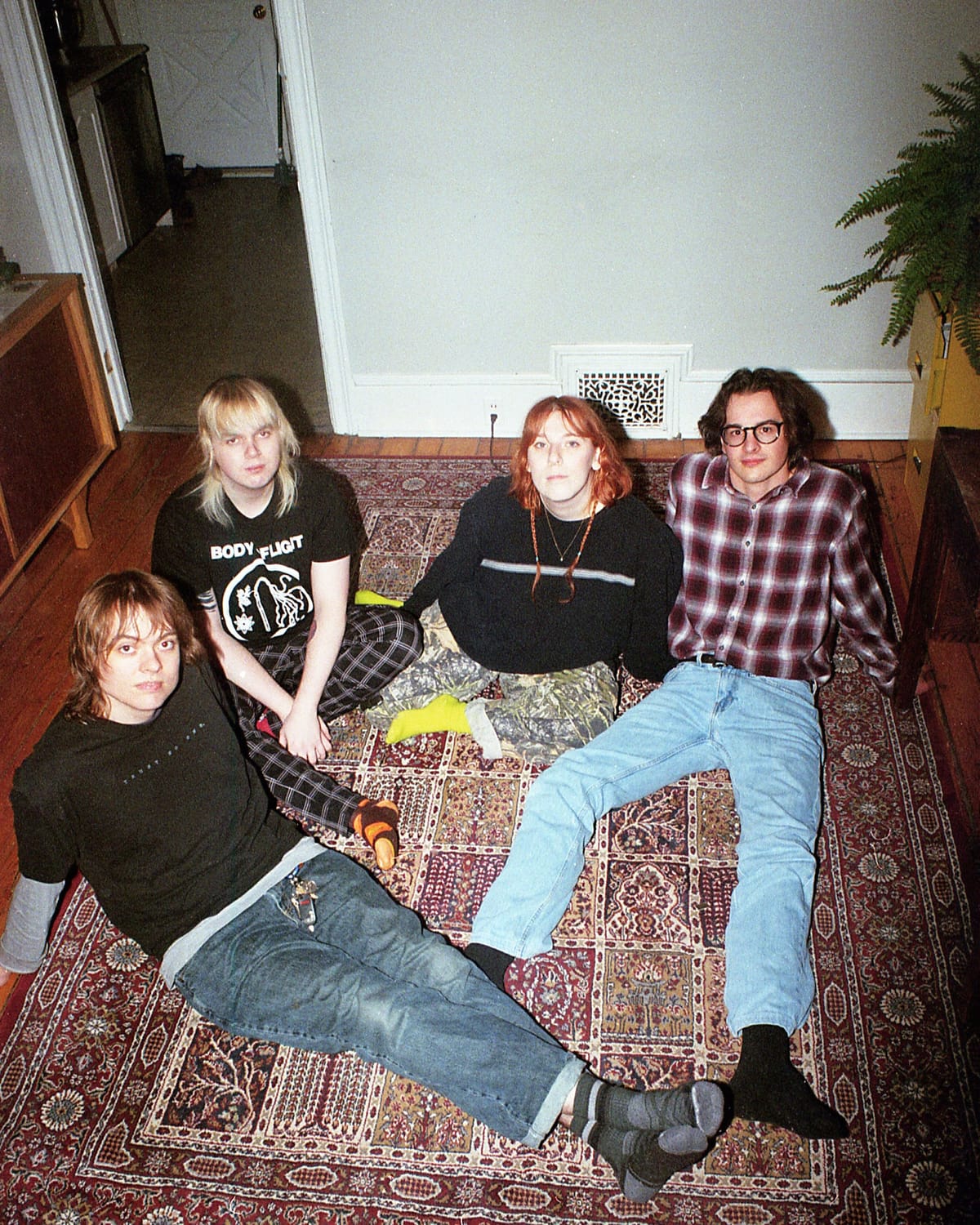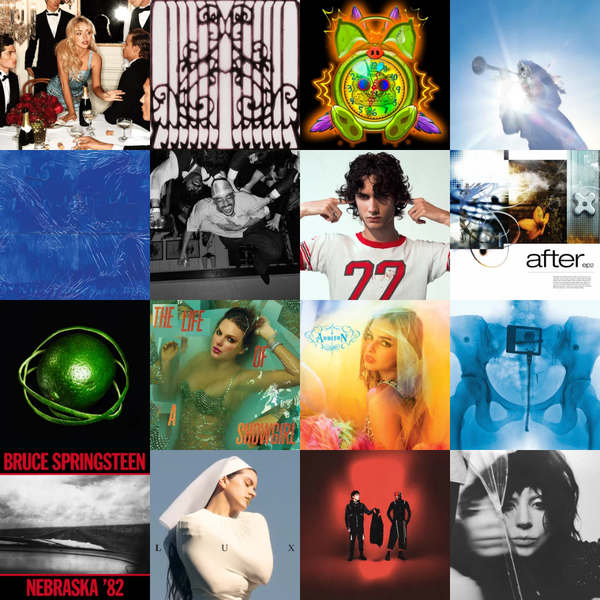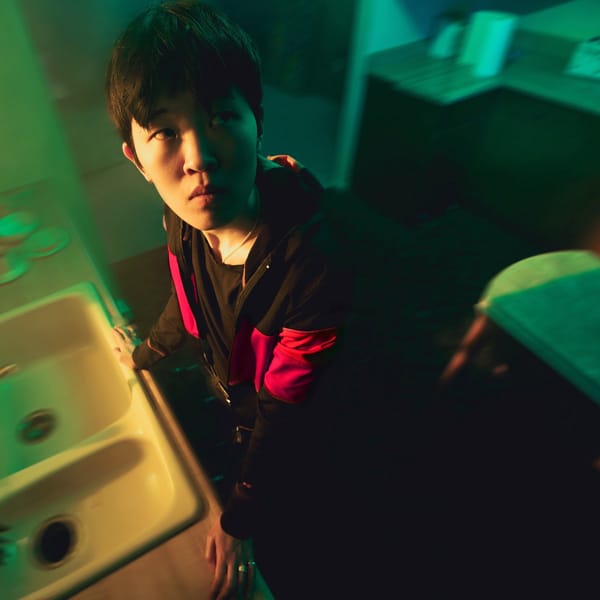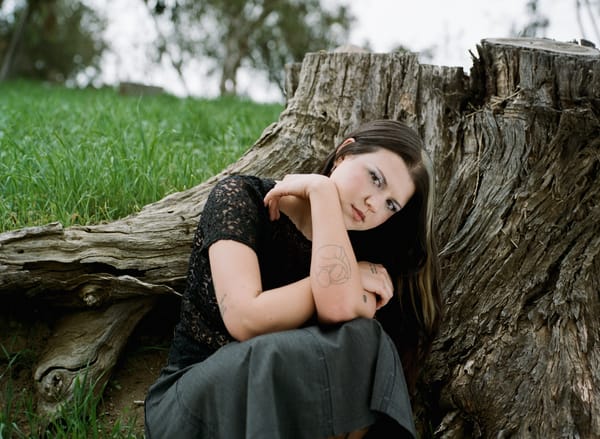Nothing Deep To Say #9: Fanclubwallet (Hannah Judge) and Producer Michael Watson Search For Identity on "Band Like That"

If you’re just joining us post-Billie Eilish review, FINNEAS diss, and NPR appearance, welcome to Nothing Deep To Say, the flagship series of Hannah Jocelyn's Transient Peak newsletter.
So many queer artists are pressured to focus on their identity in interviews, and I want to give self-producing musicians the freedom to nerd out about their own music – informed by my own experience as a writer, audio engineer, and musician. Oh, and a queer person. Feel free to donate to the Ko-Fi if you like this or subscribe to the paid tier, with content not in the main newsletter! Some very exciting stuff coming there, including an interview with YouTube music critic Mic The Snare.
Hannah Judge makes catchy, inventive bedroom pop music as Fanclubwallet – anyone who loves Sidney Gish’s No Dogs Allowed or enjoyed the music of previous guests like Tommy LeFroy should immediately listen to her new EP, Our Bodies Paint Traffic Lines. Her music, which she produces with longtime friend Michael Watson (they/them), has garnered over 145,000 monthly Spotify listeners.
The very funny video for lead single “Band Like That” stars the real band Sorry Snowman (whose Dax Cardoso-Grant is one of Judge’s roommates) as Judge kidnaps the lead singer and takes over his band. It's a charming, irreverent way of expressing the very real struggles that queer musicians might face with representation, one Judge herself has discussed before in her comics.
That video and song reflects the mission statement for this EP, which was the first time Judge and Watson recorded as a full quartet with Nathan Reid and Eric Graham joining in.
Written during a severe writer's block, a lot of the EP involves a search for identity, with aching lyrics like "this wet pavement/makes me wonder where your brain went/I think I feel your tonsils in my throat" on EP highlight "Complex Weather."
She credits her band for helping her through this time period, so it's appropriate that Watson and Judge are so in sync they finish each other’s sentences; the transcription app Otter mistook one for the other several times, even switching mid-sentence. To quote Judge, in a press statement about her band members: "They feel like my arms and my legs. Extensions of myself!”
Below, we talk about how the two (who, despite Otter's insistence, are separate people) got into production, and break down “Band Like That.” On the paid tier, we talk about the video, Watson's mix bus processing, and Judge's background in comics – stay tuned for that!
How did you get into production?
Michael Watson : I was interested in recording music when I was like a kid. I remember using my grandparents computer and just like finding any online like crappy little recording software I could find. And I just kept downloading free DAWs until I worked my way up to torrenting Cubase. Then eventually, I got Pro Tools as a gift. When I was 13 or 14. It's just always been my calling.
Hannah Judge: I had GarageBand in high school. I didn't get into actually producing music until my friend Etta asked “can you produce my EP?” I said, “okay, sure.” And then I had to learn how to use Logic. Michael and I were in a band together before called Gullet. And we sent demos back and forth to each other a lot. And Etta (of Gullet) had all these really good demos. And she said, “I think you can make them sound better”. I said “I guess so!”
What is the story between You Have Got To Be Kidding Me and this new EP?
Hannah Judge : I think the last couple of years, we've just been doing a lot of touring, I’m feeling a lot better now. took a break from writing for a while, I had a really bad writer's block. I went to New York and tried to write with other people. I did not like it. And then I wrote the verses for “Band Like That” I thought, I need a chorus. But I don't have one and I still have writer’s block, so I guess it’s over. And then I was like, “wait, why don't I just go ask Michael and ask Nat [Reid] and Eric [Graham]”. It just all came together super easily.
Michael Watson: I would say You Have Got To Be Kidding Me was still born out of the bedroom. And then this EP was born out of being in a band on tour together.
This is the most live instrumentation you’ve had on a project so far.
Michael Watson: We just wanted to sound like an early 2000s indie rock band.
Hannah Judge: It's felt like a band in a lot of ways for a long time, with all the touring that we've done together - the way some songs have changed live after getting everyone's input on everything, it just made a lot of sense to finally actually write together.
You mentioned jamming Band Like That with your live touring group. How did the process change for the songs? Was the process before just in your bedroom figuring things out and then taking it to Michael?
Hannah Judge: Pretty much, before I'd write like half a song, go “okay, that's enough,” then send it to Michael and go “can we finish this now?" It was usually me in my bedroom, then for “Complex Weather” we wrote that right after our van had broken down and we were stranded in Alabama.
That’s not a great place to be stuck in, as a queer person!
Hannah Judge: It was like, we gotta do something. But we were stuck in Alabama. I had managed to find an Airbnb because it was like the only option for one night and all our stuff from the van, we had to leave a lot of it, but I was screaming and crying. And then Michael came into the bedroom, and we had the guitar and we wrote “Complex Weather.”
Michael Watson: [Almost] all the songs on the EP were actually born out of us being in a room together; you and me, you and Eric, you and Nat.
BAND LIKE THAT:
Where did the idea come from? Was it actually inspired by Sorry Snowman (who star in the video)?
Hannah Judge: I found this band Tee Shirt. And they're from France, they make power pop music and I was like Oh, my God, this is so good. And I then started thinking about all the bands that I wish I was in, like Sorry Snowman and Metric. And so I wrote the lyrics for it. When we got to LA, that's when I started writing the music. It was cool, because we finished writing it with the whole band. And then we were so excited about it that we rented a practice space on one of our off days, and then we played it on the tour.
Michael Watson: As soon as we got home, we recorded it the next day.
Talk about the production process:
Hannah Judge: I’ve always been demanding to sit next to Michael while they’re doing things, and that's been really great too, because now I can make my way around Pro Tools so sometimes you'll leave to do something else and I’ll be like ‘Okay, I'll record the guitars now.
Michael Watson: When you make a demo, you have produced it already. That makes my life easier.
Hannah: We end up using a lot of this stuff that I do in Logic. We don’t rerecord the synths -
Michael: A lot of the production stuff you do stays.
Hannah: And especially on the last album, a lot of the drum samples stayed as well.
Michael: I’ll usually keep them as a loop, but -
Hannah: Because it was more band-y, this was Michael’s ‘shining star moment.’
Michael: But you still had a lot of great ideas.
GUITARS:
Michael Watson: There's a bunch of MIDI guitars buried in because I was having trouble getting the chorus to really hit. So I do all the guitar power chords in MIDI as a way to beef up the real guitars.
I see you used a Roland JV-2080 on this song. Do you have any other hardware synths?
Michael Watson: I didn't even like to think about rack synths for a really long time. And then I saw that Sloan Struble of Dayglow makes breakdowns of his Logic sessions and uses the JV-1080 a lot, which is the slightly more popular version. And I loved all the nostalgic 90s sounds on it. That’s on “Band Like That”, as well as my microKORG that I use for synth stuff.
DRUMS:
How did the mixing process change for you when recording live drums as opposed to more processed drum kits?
Michael Watson: The production is more sparse, and I almost wanted to make the drums less punchy even though they're live now. It's so easy to get this like massive, like an 80s drum sample and just like thrown in there but with going for that more early 2000s indie rock I don't know if it's changed. I don't know. I do look at every song differently. So I don't know if I was thinking “this is super different.” I'm also super used to recording and producing bands as a group.
Hannah Judge: We recorded our guitar amps this time [as opposed to DI], we never do that. We also had to record the drums in two different places. There was a lot of redoing things when getting it to sound huge.
Michael Watson: I feel like when people think of my production, a lot of the time they say “really tight, punchy drums.” They're definitely still pretty punchy, but I wanted to try moving the spectrum a little bit to the kick and snare not dominating the mix. I just want it to be more natural-sounding. Especially for “Easy”. I feel like “Easy” is the one song where you can really like to hear that I've mixed the snare pretty like chill. For “Band Like That” you have to have some leeway with that. I always trigger my kick and snare. And then if you mix those really loud, you can really easily get a really loud kick and snare. So I just chose samples that were less attack-y.
So it’s all triggered?
Michael Watson: They are live drums, but the kick and snare have a layer. In the past, I might have just cranked the attack and the compression on the triggers.
VOCALS:
Michael Watson: We really scattered the vocal tracking.
Hannah: We did “Band Like That” at a studio in Ottawa -
Michael: Then every other song was just you in the cabin.
Hannah: We did lo-fi vocal recording on a Shure microphone -
Michael: You tracked your own vocals for “Easy”, then we tracked you for “Picture of Her” and “Our Bodies Paint Traffic Lines”
Hannah: We tried to redo the vocal. We were like, “oh, these are just demo vocals, we’ll re-record when we go to a nice studio, and I was like “oh I hate these.”
Michael: With vocals, especially your first take, I find it's hard to recreate it.
Hannah: We had demo-itis.
Michael: It wasn't even a mic stand; she just had the Shure mic in her hand.
Hannah Judge: I recorded those vocals. Because we had just come off tour and I was already losing my voice and then I remember recording the Band Like That vocals and thinking [guttural voice] I sound like I smoke.
SOUND EFFECTS:
Hannah Judge: I feel like you [Michael] tried a lot of new things to get everything to sound bigger. And there's like a crowd cheering. You don’t really hear it, but we got the CDs for the EP yesterday and we were listening to the CD. And I was like, “Can you hear the crowd cheering?” Everything sounds good on CD”!
Michael Watson: At the end of the song, there's this newscast from the 90s that I downloaded from Archive.org, then I formant shifted and put onto the end.
I was wondering what that was! Any reason it’s there?
Hannah Judge: You know, sometimes you listen to a song and can you hear something that's not there? , exactly. it's not actually there. It sounded like the guitars were making a ‘talking’ sound and I was like “we have to add real talking.”
Hannah Judge: I use that for everything when I used to make like Lo Fi sad electronic music I would always go on the Internet Archive and download old voicemails.
What’s next?
Hannah Judge: I think it's just going to be a mix of everything I expect. Um, I am excited to know that I'll probably never get stumped on a bass part ever again. Like I’ll just get a band member to do it. I think a lot of my writing has to start from me being really depressed and alone in my room. But I don't think all of it has to. So I think I think it's definitely going to be like a beautiful, equal mix of everything.
Do you feel like you’re over the writer’s block?
Hannah Judge: I feel like I'm 85% over the writer's block. I think now, I'm the only thing like stopping myself. You know what I mean? I'm writing things. But then sometimes I'm what if I'm not good enough? And then that's down.
A lot of people seem to think you're good - 145,000 people a month!
Hannah Judge: It's true. I'm also the worst at computing that.
Michael Watson: Hannah doesn't know if that's a lot or like nothing at all.
Hannah Judge: Well, I know it's not nothing at all.
Do you see that for yourself in live shows?
Hannah Judge: That's why I love touring. When we go on tour. I’m like “I'm in a band like this is real.” But otherwise, I just like live in Ottawa. And I work at School of Rock.
You’re the third person I’ve interviewed to mention School of Rock! I should get them to sponsor this newsletter.
Michael Watson: Our whole band works there!
Talk about finalizing the EP.
Michael Watson: We were finishing tracking at Port William Sound, so I did a little bit of mixing there, then most of it was done here in January, because for some reason we found out about the EP coming out. Like we should have known but we were like oh shit, it has to come out in a month and I have to finish it in like two weeks. And I had a trip to Toronto,where I did five hours in the train. every second I could get I was like whipping out my laptop and like , like didn't come I just feel it
Hannah Judge: We got a grant for it. And the grant had a really strict deadline. And I’d forgotten.
Michael Watson: It was all of our bads, we just forgot when it was supposed to come out. It’s good because it made me do it fast.
What headphones did you mix on?
Michael Watson: Shure Se215 in-ear monitors to check stuff - for whatever reason they're like really not, I don't know, boosted it but they're like high mids like I find high mid stuff that's like piercing comes through really well on these just because they're in your ears too.
Michael Watson: My mains are just the cheapest Audio Technica headphones, the M20s. Because I find they're super flat. They're not super bassy and I can just hear everything. I find like the [more popular] M50s are too boosted on the highs and the lows.
Hannah Judge: We also test every mix in the 2002 Honda Civic.
Michael Watson: A car test not only in a car, but a car with crappy speakers.
Do you have studio monitors?
Michael Watson: I have Mackie MR5s. I think they're from the mid-2000s.
I think that's one of the more inspiring things about doing this, that people don’t have the fanciest gear all the time.
Hannah Judge: I don’t have that kind of money. I've always been really pro-that; I used to do photography. And I remember seeing photographs posted, then the photographer saying I took these pictures on a camera that your mom probably has. You know you’re good if it looks good no matter what you’re using.


